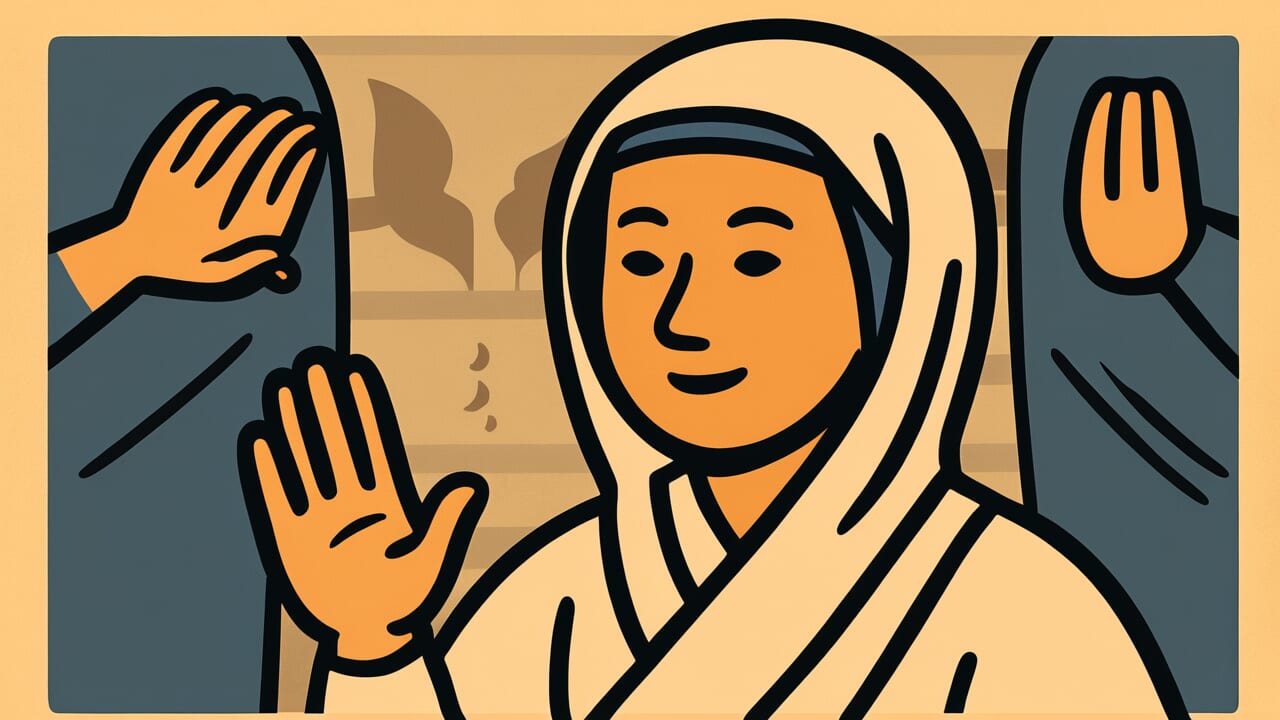How to Read “Excessive love makes her become a nun”
Chōai kōjite ama ni nasu
Meaning of “Excessive love makes her become a nun”
“Excessive love makes her become a nun” means that when love becomes too intense, it can actually restrict and harm the person you care about.
This proverb applies when parents overprotect their children so much that they take away opportunities for growth.
It also describes situations where romantic partners love so strongly that they limit each other’s freedom and actions.
The saying even fits cases where supervisors favor employees too much and prevent them from becoming independent.
People use this expression because it captures a difficult truth about relationships.
Love is born from good intentions, but when it goes too far, it can narrow someone’s life.
Today, people use it to warn against overly controlling parent-child relationships or possessive romantic partnerships.
The lesson is clear: true love means respecting someone’s freedom and supporting their growth.
Origin and Etymology
The exact origin of this proverb in historical texts is unclear.
However, the structure of the phrase reveals fascinating background information.
“Chōai” means to cherish and care for someone with special affection.
“Kōjiru” means to escalate or intensify beyond reasonable limits.
The phrase “ama ni nasu” (make her become a nun) forms the heart of this saying.
In ancient Japan, becoming a nun meant cutting ties with ordinary society and entering religious life.
This wasn’t always a personal choice.
Sometimes families or powerful figures forced women into this path.
Throughout history, many high-ranking women were made to become nuns for political reasons or family schemes.
This proverb likely emerged from that historical context.
Out of love, someone might isolate the beloved from the world’s eyes, trying to keep them for themselves alone.
The result? They steal that person’s freedom and prevent them from living their true life.
The phrase “make her become a nun” powerfully expresses this ironic situation.
Love is a beautiful emotion, but when excessive, it can bring unhappiness.
Our ancestors keenly observed this paradoxical aspect of human nature and left it as a warning for future generations.
Usage Examples
- I worried so much about my daughter that I did everything for her ahead of time. Now, like “excessive love makes her become a nun,” she can’t make decisions on her own.
- I loved him so much that I demanded daily contact. My friend warned me it was like “excessive love makes her become a nun.”
Universal Wisdom
“Excessive love makes her become a nun” reveals a dangerous side of humanity’s most beautiful emotion: love.
When we love someone, we want to protect them and make them happy.
But when that desire grows too strong, it transforms into a need to control them.
This is the eternal dilemma of those who love.
Why do people restrict those they love?
It comes from fear of loss, anxiety about them getting hurt, and desperation for their love to be returned.
The deeper the love, the stronger these feelings become.
Before we realize it, we’ve stolen their freedom.
This proverb has been passed down for centuries because this contradiction lies at the core of human nature.
Parents love children, lovers love each other, friends love friends.
But is that love truly for them, or is it to ease our own anxieties?
Our ancestors pose this question to us.
True love means setting someone free.
Even knowing the fear of letting go, we must trust in their growth and happiness and watch over them.
That courage is what real love looks like, this proverb teaches us.
When AI Hears This
Continuously pouring love into someone is, from a systems engineering perspective, “positive feedback.”
The more you love, the more you want to love, creating a cycle of increasing affection.
However, every system has processing capacity limits.
Humans who receive love also have an upper limit to how much they can accept.
Imagine an air conditioner heating a room.
If it ignores the set temperature and keeps heating, eventually a safety mechanism activates and forces shutdown.
This is an “emergency brake” protecting the system from overload.
Making someone become a nun is exactly this emergency brake.
When love becomes so excessive that someone’s life approaches breakdown, the system automatically switches to “isolation mode.”
What’s fascinating is that this reversal comes not from lack of love, but from excess of it.
In ecosystems, when one species explodes in population, food shortage causes sudden decline.
Economic bubbles also burst when excessive optimism invites collapse.
This proverb demonstrates a law common to complex systems: “When positive input becomes excessive, the system produces the opposite output for self-defense.”
The most human of emotions, love, is actually governed by cold mathematical principles.
Lessons for Today
This proverb teaches us the importance of balancing love with freedom.
When you care deeply about someone, that feeling is wonderful.
But can you express that love as trust in them?
Trusting them to handle things, recognizing their right to fail, respecting choices different from yours.
These aren’t easy because letting go requires courage.
In modern society, we can constantly monitor someone’s actions on social media or check their location with GPS.
Because technology has advanced, we must consciously work to maintain distance.
If you truly care about someone, you need the courage to not know, the patience to wait, and the generosity to accept their choices.
If you’re raising children, have the courage to let them fail.
If you’re in a relationship, give your partner space and time.
In the workplace, trust your subordinates’ growth and delegate to them.
Love shouldn’t bind someone.
It should become the foundation that lets them fly freely.
May your love become someone’s wings.



Comments